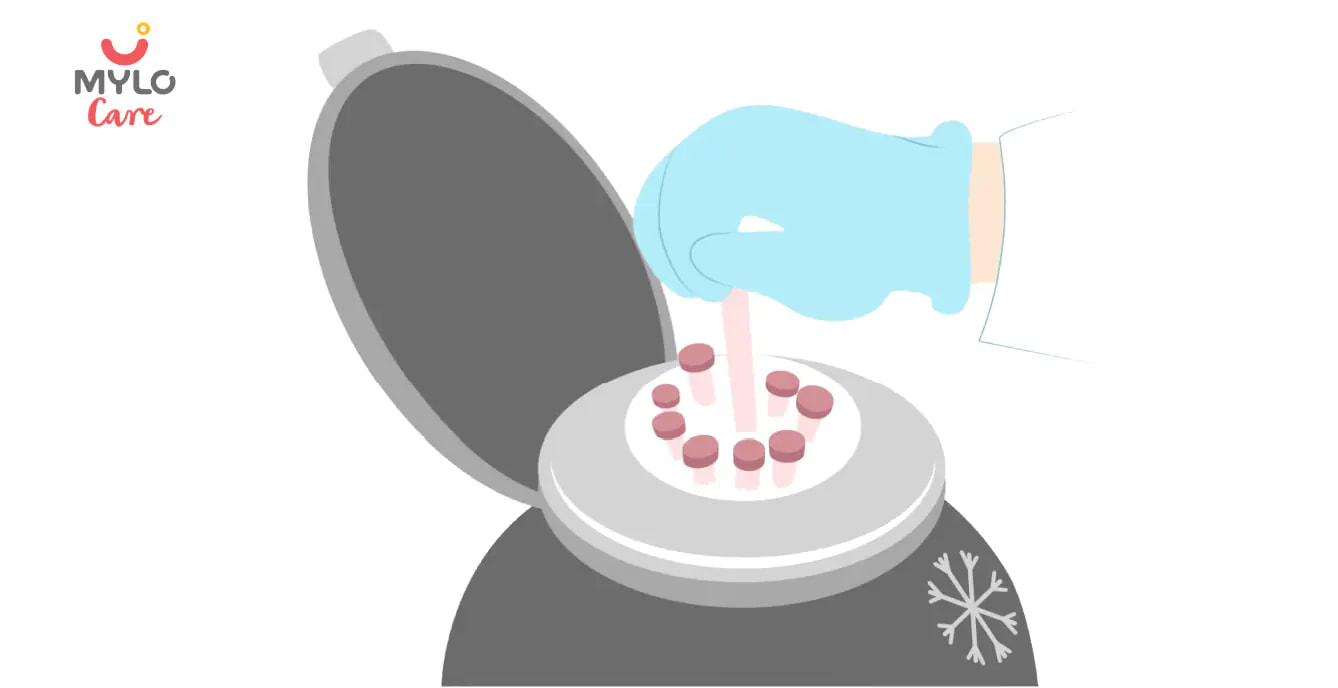- Home

- Male Infertility

- Freezing Sperm: Preserving the Possibility of Parenthood
In this Article
Male Infertility
Freezing Sperm: Preserving the Possibility of Parenthood
Updated on 7 March 2024
Life can be unpredictable, and there may come a time when circumstances lead us to ponder the fragility of our fertility and the delicate threads that weave the fabric of parenthood. In these moments of reflection and contemplation, the concept of freezing sperm emerges—a scientific gift to humanity that offers hope, possibility and the preservation of a cherished dream.
Freezing sperm, also known as sperm cryopreservation, is a remarkable scientific advancement that allows individuals to safeguard their reproductive potential for the future. Explore with us all the facts about sperm freezing, from its importance and process to the procedure's pros and cons. Read till the end to expand your knowledge about sperm banking.
What is Sperm Freezing?
Freezing sperm is a technique that involves preserving and storing sperm cells in extremely low temperatures, typically around -196 degrees Celsius (-321 degrees Fahrenheit). This process allows individuals to safeguard their sperm for an extended period, often years or even decades while maintaining its viability and fertility potential.
By freezing sperm, individuals can overcome various challenges, such as medical treatments, fertility preservation, or personal circumstances, that may pose a risk to their reproductive abilities.
Why Sperm Freezing is Important?
Freezing sperm holds significant importance for various individuals and situations. Here are some key reasons why sperm cryopreservation is crucial:
1. Fertility Preservation
Sperm freezing allows individuals facing medical treatments, such as chemotherapy or radiation therapy, to preserve their fertility. These treatments can harm sperm production, and freezing sperm beforehand ensures the possibility of future conception.
2. Assisted Reproductive Techniques
Sperm freezing is pivotal in assisted reproductive technologies like in vitro fertilization (IVF) and intracytoplasmic sperm injection (ICSI). By freezing sperm, it can be stored until it is needed for fertilization, enabling couples to pursue their dreams of starting a family.
3. Reproductive Planning
Sperm freezing provides security and peace of mind for those who wish to delay parenthood for personal or professional reasons. It offers the flexibility to preserve sperm when fertility is at its peak, ensuring the option of parenthood at a later stage.
4. Fertility Challenges
Some individuals may experience fertility challenges due to genetic disorders, low sperm count, or other reproductive issues. Sperm freezing allows them to store healthy sperm for future use, increasing their chances of conception when ready.
5. Family Building for Same-Sex Couples
Sperm freezing plays a vital role in family building for same-sex male couples. By freezing one partner's sperm, they can use it for assisted reproduction techniques, such as IVF or surrogacy, to achieve their dream of becoming parents.
Who Can Benefit from Freezing Sperm?
Freezing sperm can benefit various individuals and couples in different situations. Here are some groups of people who can benefit from sperm freezing:
- Individuals undergoing medical treatments
- Couples pursuing assisted reproductive techniques
- Those with occupational hazards or travel
- Individuals with genetic disorders
- Same-sex male couples
- Individuals delaying parenthood
By freezing sperm, individuals can take control of their reproductive choices and increase their chances of building the family they desire.
The Sperm Freezing Process
The process of sperm cryopreservation involves several steps to ensure the viability and long-term preservation of sperm. Here is an overview of the sperm-freezing process:
1. Consultation and Evaluation
The process begins with a consultation with a fertility specialist. They will assess your medical history, conduct a physical examination, and discuss your reasons for sperm freezing.
2. Sperm Collection
Once you have decided to proceed with sperm freezing, the next step is sperm collection.
3. Sperm Analysis
The collected sperm sample is sent to the laboratory for analysis. The laboratory will assess parameters such as sperm count, motility (movement), and morphology (shape) to determine the quality of the sperm.
4. Sperm Processing
To improve the chances of successful freezing and thawing, the sperm sample undergoes processing. This involves adding a cryoprotective agent to protect the sperm cells during freezing. The sample is then divided into smaller vials or straws for individual freezing.
5. Controlled Freezing
The processed sperm samples are gradually cooled using a controlled freezing technique. This slow freezing process helps to minimize damage to the sperm cells and maintain their viability.
6. Storage and Monitoring
The frozen sperm samples are stored in specialized cryogenic tanks that maintain ultra-low temperatures. These tanks are regularly monitored to ensure the stability and security of the samples.
7. Thawing and Usage
When ready to use the frozen sperm, the vial or straw is thawed under controlled conditions in the laboratory.
You may like : How To Make Sperm Stronger For Pregnancy
Preparing for Sperm Freezing
Preparing for sperm cryopreservation involves several essential steps to ensure the best possible outcome. Here are some key aspects to consider when preparing for freezing sperm:
1. Consultation with a Fertility Specialist
Schedule a consultation with a fertility specialist who specializes in sperm freezing.
2. Lifestyle and Health Optimization
To optimize the quality of your sperm, it's essential to adopt a healthy lifestyle. This includes maintaining a balanced diet, exercising regularly, getting enough sleep, managing stress levels, and avoiding harmful habits such as smoking, excessive alcohol consumption, and drug use.
3. Abstinence Period
Follow the abstinence period your fertility specialist recommends before providing a sperm sample for freezing. Typically, this involves refraining from any sexual activity or ejaculation for a certain number of days to ensure a higher concentration of sperm in the sample.
4. Medication and Supplements
Inform your fertility specialist about any medications or supplements you are taking, as some medications may interfere with sperm quality or the freezing process.
5. Discuss Future Plans
It's important to discuss your plans with the fertility specialist. If you are considering using frozen sperm for assisted reproductive techniques, such as intrauterine insemination (IUI) or in vitro fertilization (IVF), they can guide the process and help you understand the options available.
You may like : Sperm Motility and Male Fertility: What You Need to Know
Sperm Freezing Cost in India
Sperm freezing costs and options can vary depending on several factors, including the fertility clinic, location, and additional services you may require. Here are some key considerations:
1. Freezing sperm cost
Fertility clinics typically charge a fee for the initial sperm freezing process, including sample collection, analysis, and cryopreservation. This fee can vary among clinics, so it's advisable to research and compare costs.
2. Storage Fees
Once the sperm is frozen, ongoing storage fees are needed to preserve the samples in the clinic's cryopreservation facility. These fees are usually charged annually or on a long-term basis.
3. Additional Services
Depending on your specific needs, additional services may be associated with sperm freezing. For example, if you require sperm washing or sperm preparation for assisted reproductive techniques, such as IUI or IVF, these procedures may have additional fees.
4. Insurance Coverage
Check with your insurance provider to determine if sperm freezing is covered under your policy.
Discussing the costs and available options with the fertility clinic you choose is essential. They can provide a detailed breakdown of the fees and guide you through any financial considerations.
Sperm Freezing Success Rates
Sperm cryopreservation, or freezing, has been practiced for over six decades, while freezing embryos and oocytes in human infertility has a comparatively shorter history of around 40 years.
Although current procedures for sperm freezing/thawing may decrease motility and survival rate by more than 50%, this reduction typically does not pose significant challenges for individuals with a healthy sperm count. Considering that a healthy man typically produces hundreds of millions of sperm per ejaculate, even with a 50% decline in motile sperm quality and quantity, several million motile and intact sperm following thawing would still be sufficient for fertility preservation through Assisted Reproductive Technologies (ARTs)
It is worth noting that advancements in cryopreservation techniques have greatly improved the chances of successful sperm freezing and subsequent use in fertility treatments, and the overall success rates have become more favorable over time.
Pros and Cons of Sperm Freezing
Pros of Freezing Sperm
- Fertility Preservation
- Flexibility in Family Planning
- Overcoming Male Fertility Issues
- Reducing Emotional Stress
Cons of Sperm Freezing
- No Guarantee of Success
- Higher Cost
- Time Constraints
- Emotional Considerations
Conclusion
In conclusion, freezing sperm offers a valuable option for fertility preservation and family planning. It allows individuals to preserve their sperm for future use, overcoming potential fertility challenges caused by medical treatments or genetic conditions. Ultimately, sperm freezing offers a pathway to preserve the possibility of parenthood and provides peace of mind in the face of fertility-related uncertainties.
References
1. Di Santo, M., Tarozzi, N., Nadalini, M., & Borini, A. (2012). Human Sperm Cryopreservation: Update on Techniques, Effect on DNA Integrity, and Implications for ART. Advances in Urology
2. Process and Pitfalls of Sperm Cryopreservation. (2017). Journal of Clinical Medicine
Tags
Freezing Sperm in Hindi, Freezing Sperm in Bengali, Freezing Sperm in Tamil



Written by
Madhavi Gupta
Dr. Madhavi Gupta is an accomplished Ayurvedic doctor specializing in Medical content writing with an experience of over 10 years.
Read MoreGet baby's diet chart, and growth tips

Related Articles
How Respiratory Syncytial Virus (RSV) Impacts Premature Babies Differently: What Every Parent Needs To Know
Adverbs: A Comprehensive Guide to help small children learn the usage of adverbs
Expand Your Child's Vocabulary with words that start with X: Easy, Positive, and Engaging Words, Animals, Countries, and Fruits
Unlocking Language Proficiency: The Ultimate Guide to Top 100 Sight Words for Kindergarten and Beyond
Related Questions
Hello frnds..still no pain...doctor said head fix nhi hua hai..bt vagina me pain hai aur back pain bhi... anyone having same issues??

Kon kon c chije aisi hai jo pregnancy mei gas acidity jalan karti hain... Koi btayega plz bcz mujhe aksar khane ke baad hi samagh aata hai ki is chij se gas acidity jalan ho gyi hai. Please share your knowledge

I am 13 week pregnancy. Anyone having Storione-xt tablet. It better to have morning or night ???

Hlo to be moms....i hv a query...in my 9.5 wk i feel body joint pain like in ankle, knee, wrist, shoulder, toes....pain intensity is high...i cnt sleep....what should i do pls help....cn i cosult my doc.

Influenza and boostrix injection kisiko laga hai kya 8 month pregnancy me and q lagta hai ye plz reply me

Related Topics
RECENTLY PUBLISHED ARTICLES
our most recent articles

Baby Massage
The Ultimate Guide to Ghee Massage for Babies

Pregnancy Best Foods
Sunflower Seeds in Pregnancy: Advantages, Risks, & Recipes

Diet & Nutrition
The Ultimate Guide on Cabbage During Pregnancy Benefits and Precautions

Scans & Tests
Double Marker Test: Everything You Need to Know for a Healthy Pregnancy

Food Cravings
The Pros and Cons of Consuming Brinjal in Pregnancy

Why You Should Consider Drinking Coconut Water During Pregnancy?
- Sneezing During Pregnancy: Causes, Risks and Treatment
- Comfort vs. Style: The Pros and Cons of Wearing Heels During Pregnancy
- A Mom-to-Be's Handbook to Safely Savoring Momos in Pregnancy
- Chicken During Pregnancy: The Ultimate Guide to Safe and Nutritious Eating
- How To Prepare Food For Your Infant/Toddler Safely? Here Are Some Tips That You Must Not Forget While Preparing Food
- Lactational Amenorrhea Method: A Safe and Effective Contraception for Postpartum Moms
- What to Do to Help Fall Asleep Faster During Pregnancy?
- Home Remedies to Control High Blood Pressure in Pregnancy
- Pizza During Pregnancy: Cravings, Comfort, and Caution for Moms-To-Be
- Baby Milestones for Development, Growth & Health in the First Year
- The Ultimate Collection of International Women's Day Quotes
- 10 Bold Web Series Streaming on Hotstar That Break the Mold
- The A-Z Guide to Identifying Vegetables Name in English for Children
- Grapes in Pregnancy: The Ultimate Guide to Benefits & Precautions


AWARDS AND RECOGNITION
Mylo wins Forbes D2C Disruptor award
Mylo wins The Economic Times Promising Brands 2022
AS SEEN IN
















At Mylo, we help young parents raise happy and healthy families with our innovative new-age solutions:
- Mylo Care: Effective and science-backed personal care and wellness solutions for a joyful you.
- Mylo Baby: Science-backed, gentle and effective personal care & hygiene range for your little one.
- Mylo Community: Trusted and empathetic community of 10mn+ parents and experts.
Product Categories
baby carrier | baby soap | baby wipes | stretch marks cream | baby cream | baby shampoo | baby massage oil | baby hair oil | stretch marks oil | baby body wash | baby powder | baby lotion | diaper rash cream | newborn diapers | teether | baby kajal | baby diapers | cloth diapers |





